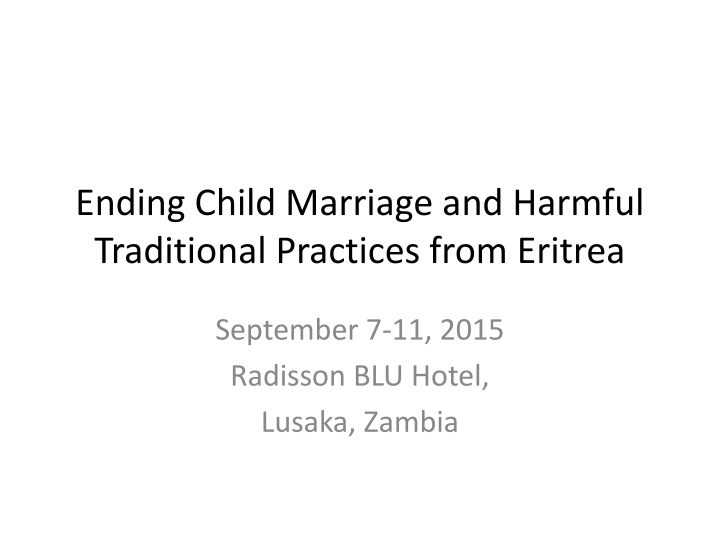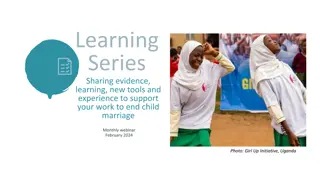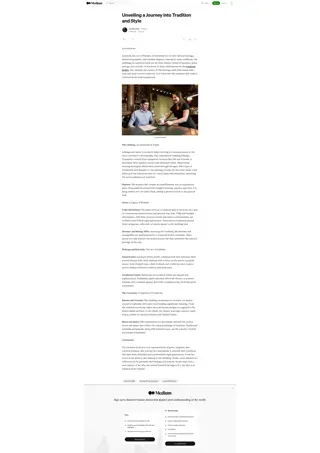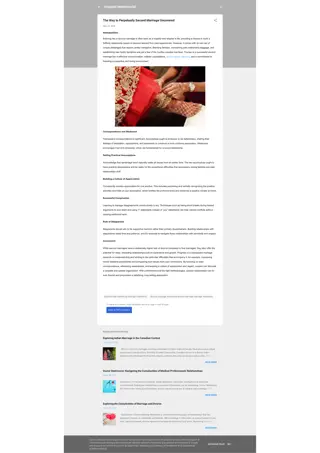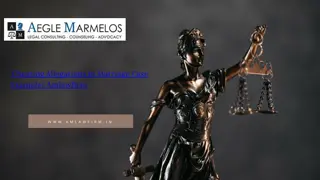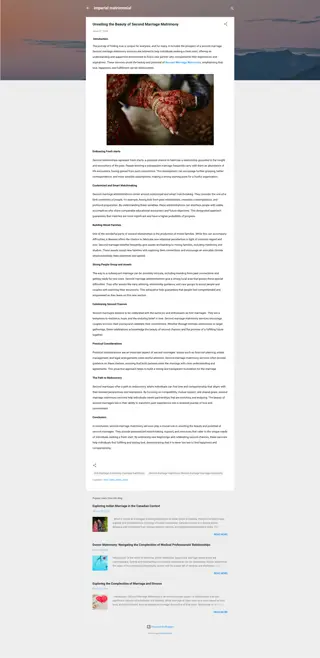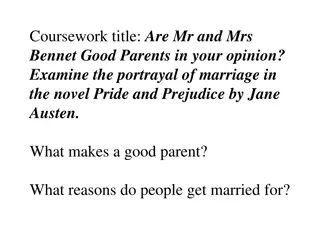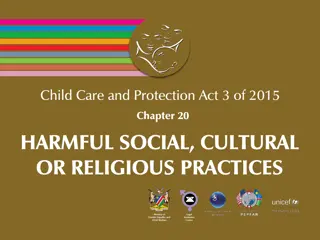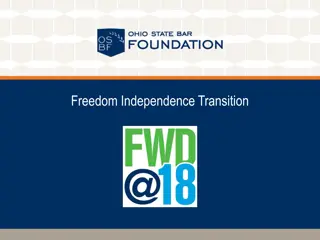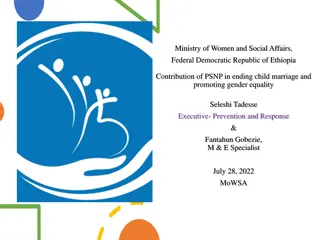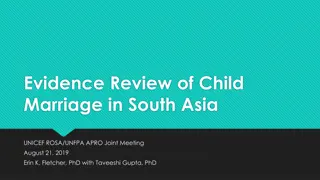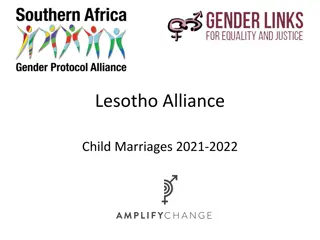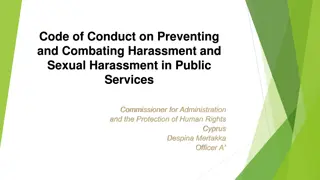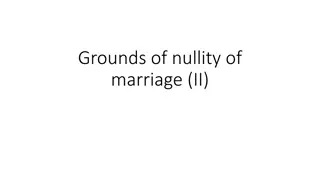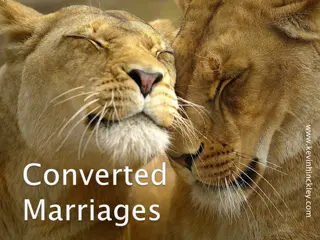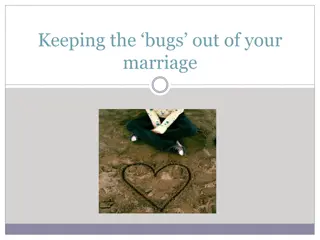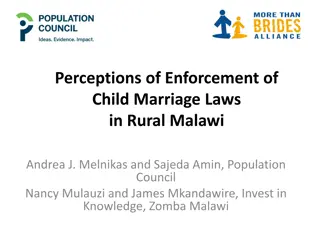Combating Child Marriage and Harmful Practices in Eritrea
The presentation focuses on Eritrea's efforts to end child marriage and harmful traditional practices, detailing the country's profile, legal instruments, and progress made in combating these issues. It highlights Eritrea's commitment to international conventions on child rights, including the African Charter and the UN Convention. The country's legal framework sets the marriage age at 18, with penalties for those involved in underage marriages. The content discusses challenges and future strategies in addressing child marriage and FGM/C in Eritrea.
Download Presentation

Please find below an Image/Link to download the presentation.
The content on the website is provided AS IS for your information and personal use only. It may not be sold, licensed, or shared on other websites without obtaining consent from the author.If you encounter any issues during the download, it is possible that the publisher has removed the file from their server.
You are allowed to download the files provided on this website for personal or commercial use, subject to the condition that they are used lawfully. All files are the property of their respective owners.
The content on the website is provided AS IS for your information and personal use only. It may not be sold, licensed, or shared on other websites without obtaining consent from the author.
E N D
Presentation Transcript
Ending Child Marriage and Harmful Traditional Practices from Eritrea September 7-11, 2015 Radisson BLU Hotel, Lusaka, Zambia
Content of Presentation Eritrea Country profile Regional and International conventions on Child Rights; International & National legal Instruments Customary Laws Traditional Practices The status of Child Marriage & FGM/C in Eritrea; The approaches used to combat child marriage & FGM/C prevention and control and The progress made Challenges and the way forward;
Eritrea Country Profile Located in the Horn of Africa Area = 124,000 sq.km Pop = 3.5 million Literacy rate: 68.5% 6 Admin Regions (Zobas) Borders with Djibouti, Ethiopia, Sudan and the Red Sea. Independence in 1991 Mountainous arid & terrain Prone to natural hazards Low income country
Regional and International conventions on Child Rights The Government of the state of Eritrea has been committed to promote & protect the rights and welfare of children; and Eritrea has signed & ratified the African Charter on the Rights & Welfare of the Child (ACRWC) in 2000; submitted its consolidated report which covers the entire 2002-2013 period. Has signed & ratified the UN convention on the Rights of Child (CRC) since 1994; and Eritrea is signatory to several international conventions that enhance the respect & safeguard the broad, & specific principles of human rights.
National Legal Instruments (ERITREA) The Eritrean Civil Code (article 581 and 329) mentions that marriageability age is attainment of 18 years. Proclamation No. 1/1991 of the GoSE specifies that any contract of marriage made between persons (spouses) below 18 years of age is null void, and that the spouses and witnesses to such marriage shall be punishable under the penal Code (Art.614); and article 158/2007 to abandonee FGM/C.
National legal Instruments (ERITREA) Art. 607. age.- 1. Criminal sanction (1) An officer of civil status or authority having celebrated the marriage of a woman under eighteen years of age or a man under eighteen years of age shall be liable to the punishment provided in the penal code if he knew or should have known such circumstances. (2) The bride groom or the bride who is under eighteen years of age, the persons who have consented to the marriage and the witness shall be liable to the punishment provided in the penal code.
Customary Laws (ERITREA) Most customary laws determine marriagability age through consensus of community elders; while the unwritten customary laws determined such ages according to physical maturity, cultural ceremonies and participation in economic activities; Most customary laws do not, however, specifically state the minimum age for marriage and other marital relationships;
Traditional Practices (ERITREA) Early marriage is associated with the deeply rooted traditional practices, because some parents believe that early marriage provides girls a better marriage opportunity; Female early marriage is traditional practice intending to protect female adolescents from engaging in premarital sex (virginity), which is perceived a crucial factor for a better marriage opportunity and family stability;
Child Marriage in Eritrea Child marriage is a problem in Eritrea, and marriage occurs relatively earlier for girls. The EPHS 2010 indicates that among women aged 20-24: 13 percent were married by age 15, and 41 percent were married by age 18 (EPHS 2010).
Child Marriage in Eritrea Not all girls face proportionately the same risk of becoming child brides within the Eritrean society. The rate of child marriage happens more in rural; less educated and lower wealth quintiles compared to urban, educated and high wealth quintiles respectively.
The median age at first marriage for women age 30-49 by area & Geographical Location (EPHS 2010) Towns 19 yrs Rural 17 yrs 22Asmara yrs Zoba Makael 21 yrs Zoba Debub Age 16 yrs
Education background, & Wealth Quintile Background Median Age at First Marriage 25 years , 5 years higher than the median age of women with middle 20 years Secondary education Middle level Education No Education Higher wealth Q lowest wealth quintile 17 years, 21 years 17 years (4yrs younger than highest wealth quintile ;
Child Marriage in Eritrea Early marriage affects girl s survival and development to their full potential; as well as deprive their rights to education. In Eritrea, early marriage is also the main reason for dropping out of school, where (69% of girls and 39% of boys) age 15-29 who ever attended school were dropped out of school (EPHS 2010).
Trends in Prevalence of Female Circumcision Percent of women age 15-49 circumcised 95 89 83 1995EDHS 2002EDHS 2010EPHS+ Note: Data for 2002 is recalculated using WHO reference standard to be comparable to 2010 data.
Daughters Circumcision on U5 & U15 Percentage circumcised Under 15 Under 5 37 33 25 17 15 12 7 4 Total Urban Rural Asmara
Reason For Not Circumcising Daughter Percent of women 66.9 8 5.5 4.1 1.5 1 Against Religion No female circumciser Against culture Family no longer practice Too young Against low
Trends of Practice of Female Circumcision Should Be Discontinued Percent of women age 15-49 82 49 38 1995EDHS 2002EDHS 2010EPHS+
Practice of Female Circumcision Should Be Discontinued By Age Percent of women Eritrea total 82% 86 85 84 81 80 77 75 15-19 20-24 25-29 30-34 35-39 40-44 45-49
Early Marriage Prevention Program Successful early marriage prevention approach should be collaborative approached by the teens, their families, teachers, health professionals, child protection Orgs, & Faith Based Orgs. communities, lawmakers, & law enforcing bodies, & other community organizations. The approach to this intervention is to strongly advocate the government authorities, religious leaders, community associations and law enforcement authorities to enforce the law; as well as to work to end child marriage;
Intervention To End Child Marriage The MoLHW has been organizing training workshops to its social workers who are stationed at sub regional levels, and also organized Child Well-being Committee CWC & Anti FGM/C whose main purpose is to expedite the implementation of the CRC and the African Charter on the Rights & Welfare of the Child (ACRWC); Members of the CWC are organized at sub-Regional level, & consists of MoLHW, MOJ, MOH, MOE, MOI, MoLG, Police, NUEW, NUEYS and 2 (14-17 yrs) teen agers; so far there are 42/53 CWC formed in the country. The priority activities of the CWC committee are to expedite Zero tolerance to FGM & pursue anti early marriage campaigns, and to abundon other Harmful Traditional Practices;
Outcome of interventions The Chile Wellbeing Committee measures the Knowledge, attitude and Practices (KAP) and other indicators of the communities in that village, and if the village is ready to declare based on the outcome of the study, them the village will declare that their village is HTP Free village; So far 10 villages has declared as HTP FREE villages, and more than 20 villages are ready and the CWC is in the process of measuring the indicators;
Challenges Working on traditional practices, takes time, because It requires strong attitudinal behavior change in families, communities and opinion leaders including religious leaders; it is also difficult to follow the practice, as it can also be performed secretly; Updated data on early marriage is required to measure progress; Strong coordination on national actors at regional and sub-regional is crucial; More funding to proceed the campaign of FGM/C and Anti-early marriage practice is required;
On Conclusions. In spite of the challenges, the GoSE is committed to pursue not only to campaign against the HTP, but to work vigorously towards the abandonment of all the harmful practices; We are also pleased to be part of this training session organized by the AU, as we can learn more from sister countries and the AU experts;
THANK YOU Demhina
